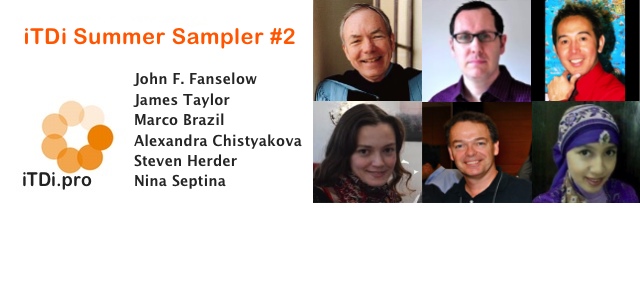Need Ambition and Vision? Find Some Heroes
– by James Taylor
Inspiration is something that we all need, whatever we do, but as educators we need an extra dose. Our job places us in front of expectant and demanding learners, from a variety of ages and backgrounds, and we are expected to deliver interesting, fresh, satisfying, stimulating and yes, inspirational classes. In other words, we have a tough job (but let’s not complain about that, it’s part of what makes it so rewarding).
So external inspiration is something that we need on a regular basis. We need to be reminded of why we do this, and what we get out of it. There are many sources for this inspiration, and often they are fairly obvious. As teachers we can look to our colleagues and if we’re lucky enough to be in that position, a mentor (and if you need a mentor, why not look at the iTDI Mentor Programme?)
Perhaps we can look at those teachers we don’t know personally, but are aware of their work through their books, talks, videos and blogs. Or we can go further afield and look at personalities whose lives seem to have focussed on the ideas of ‘educating’ society, such as Ghandi, Martin Luther King or Nelson Mandela. They are people who have tried to change the world on a big scale, just as you may wish to change it on your own small scale.
Personally, while also looking for my inspiration from those types of people, try to be inspired by more unlikely sources. These people are my heroes, not specifically because I’m a teacher, but more because of their ambition and their vision.
My first hero is Thomas Heatherwick who, as wikipedia states:
“…is an English designer known for innovative use of engineering and materials in public monuments and sculptures. He heads Heatherwick Studio, a design and architecture studio, which he founded in 1994.
Heatherwick’s most renowned works include the B of the Bang, The Rolling Bridge, East Beach Cafe, the so-called ‘Boris’ New bus for London and the Seed Cathedral. Heatherwick also conceived the design for the 2012 Summer Olympics flame cauldron, which features 204 individual ‘petals’ symbolising each country participating in the Games. The ‘petals’ converge with one another to create a unified flame symbolising hope and peace.”
In my view Heatherwick is a genius. He transforms the everyday features of our landscape into stunning works of art and has a remarkable ability to make highly conceptual ideas into simply beautiful objects.
My second hero is James Murphy, described by Wikipedia again as:
“James Murphy is an American musician, producer, DJ, and co-founder of record label DFA Records. His most well-known musical project is LCD Soundsystem.”
LCD Soundsystem are one of my favourite bands of all time, but that’s not the only reason he’s a hero to me. As described in the Guardian in 2004, “A sharp, dry young graduate, who majored in English, Murphy was in talks with (TV) producers… They told him they were looking for writers for a new sitcom and sent him some scripts but, intent on pursuing a career in music, he failed to respond. He even ignored their offer to be the first staff writer on the show. Its name? Seinfeld. He still has the letter pinned to the wall of his office, a constant reminder of what he refers to as “the biggest mistake of my life”. He’s not proud of it.
“Failure is not a positive,” he tells me. “And I speak as a … lifetime failure.”
He spent years messing around, not taking life seriously until he reached his thirties, took a serious look at himself and decided to get serious about his music. At an age when most rock musicians are washed up, he made some of the most joyous music I’ve ever heard.
So the obvious question is how do a designer and a musician make me a better teacher? What can I learn from people operating in those radically different media?
Well, from Heatherwick I have learned to never accept anything at face value. It is possible to make beautiful things from difficult or challenging situations. Whereas he might transform air vents into angel wings, I might have to transform an unwilling student into a willing one, or a boring coursebook into a useful resource.
And from Murphy I have learnt that I should never settle for mediocrity. Stuck in a rut, he decided to transform his life and make something wonderful. I must never think that a boring class is acceptable, that a learning opportunity can just be skipped, or that a student can be neglected. I must always expect more from myself and be the best I can be, all the time.
This is the inspiration I need to be a better teacher. Although people like Heatherwick and Murphy (and Darwin, and Welles, and Waits, and Turning) have little practical application for my teaching, their influence is as profound as my teaching heroes.
James’s Heatherwick shelf (below)
So my recommendation to you is to find your own heroes who you can learn from. This isn’t a new idea, people have been surrounding themselves with saints and martyrs for centuries, but now we have the choice to learn from a massive variety of people. Find your heroes, study them, listen to them speak about what made them who they are, reflect, and then do as they say. Remind yourself of their genius by putting pictures of their work on your walls, and gaze upon it when you need help. Gather up all that positivity and inspiration and use it to become a better teacher and a better person. – James Taylor
Learn more!
Thomas Heatherwick: rolling bridge / TED talk / Olympic Cauldron
James Murphy: All My Friends / ‘I speak as a lifetime failure’
Read more work from James Taylor on his always fascinating blog TheTeacherJames.









